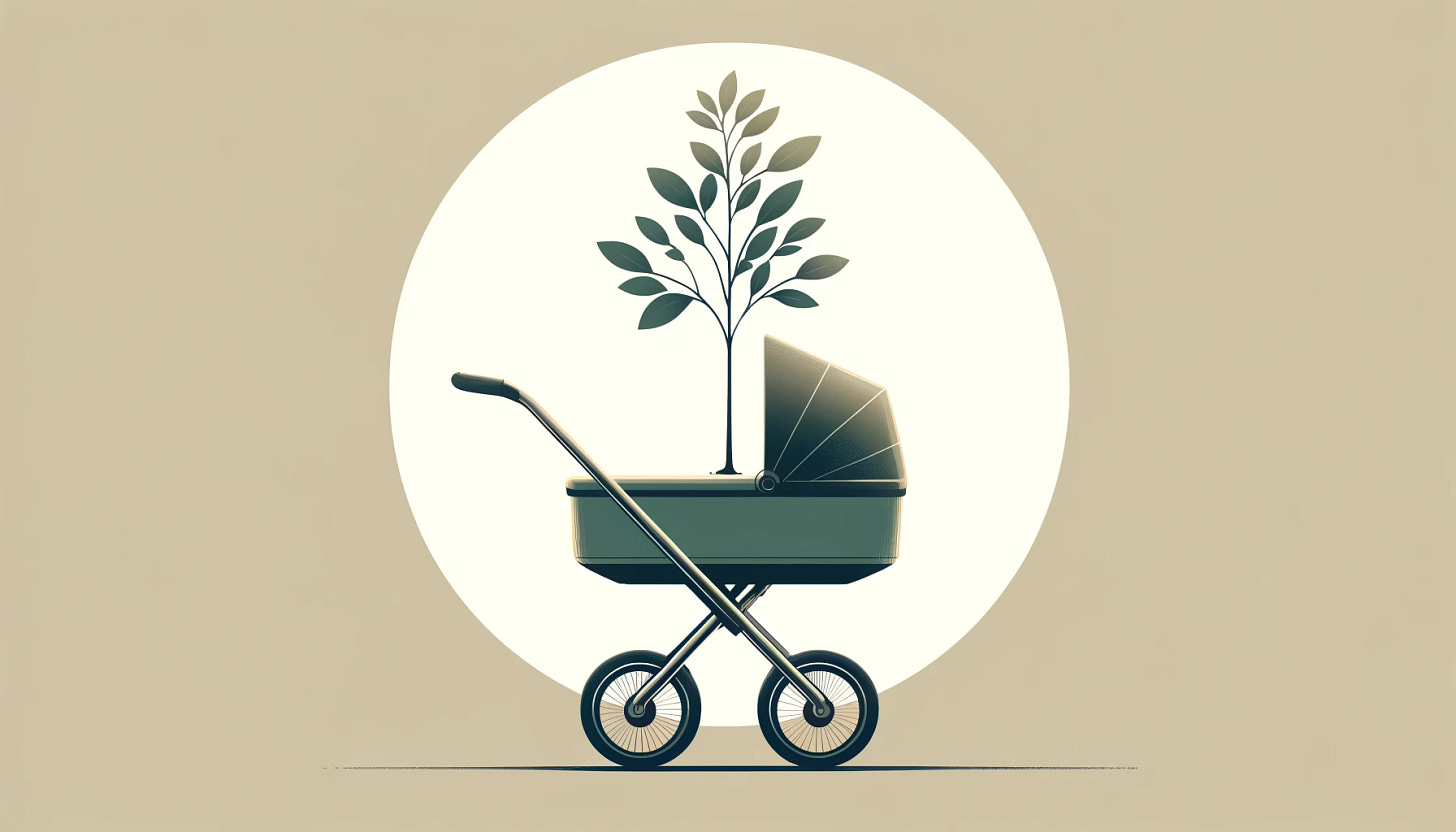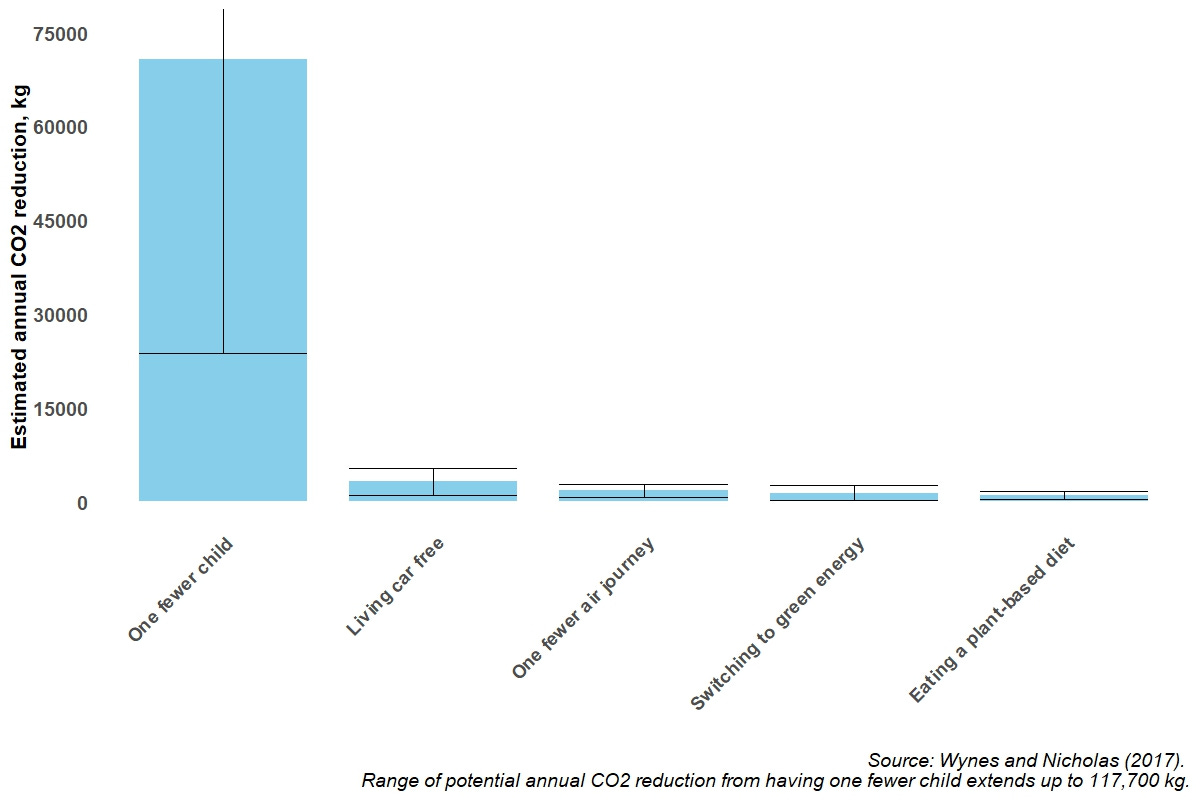Generation Net Zero
The carbon emissions of having children are wildly exaggerated
Is having fewer children one of the greenest things you can do? People increasingly think so and a few behave accordingly. A small percentage of childless people now cite environmental concerns as the reason that they have not had children. There was a short-lived activist group, Birthstrike, focused on this issue and in 2019, Prince Harry and Megan Markle told Vogue they had committed to having no more than two children for the sake of the planet.
In this piece, we explain why having a child is actually much less bad for the environment than many people think, and how overly-gloomy modelling has led people to overestimate the effect of having a baby on the planet.
Wynes and Nicholas (2017), a paper that's been downloaded stunning 948,000 times, found that not having a child is by a wide margin the best thing you can do for your annual carbon footprint, with the midpoint estimate being 71,000 kg. Giving up your personal car (3,100 kg), not going on holiday abroad (1,750 kg) and becoming a vegan (950 kg) all pale in comparison. Making a splash far beyond the academic world, the paper’s claims were reported in the pages of leading newspapers and is still frequently cited seven years on.
But there is a major snag with Wynes and Nicholas (2017): the numbers given for the carbon footprints of children are based on the assumption that the amount of carbon emissions per capita will remain at the 2005 level in perpetuity, which is the central assumption of a 2009 paper from where Wynes and Nicholas’ figures originate. [1] But this is a far cry from what’s actually been happening in the developed world, including the UK.
Per capita emissions have declined in the UK, US, Canada, EU and Japan since 2005. The UK has done exceptionally well, having reduced its emissions per capita by half, from 9.4 tonnes in 2005 to 4.7 in 2022. A mixture of policy interventions and technological improvements have enabled this, and there are reasons to remain optimistic that both of these trends will continue. Given the UK’s commitment to reach Net Zero by 2050, government policy will continue to steadily reduce emissions. Meanwhile, the rapidly declining price of solar power is just one example of how technological advancement is reducing our carbon emissions.
The 2009 paper that Wynes and Nicholas drew on also contains projections for what it describes as an ‘Optimistic’ scenario, where per capita emissions in each country decline to 0.5 tonnes per annum by 2100 in every country. This would translate to an additional carbon footprint per extra child of 3 to 7 tonnes of CO2. Still a relatively high figure, but now much more comparable with other activities, like carrying on eating meat. And if we are successful in reaching Net Zero by 2050, or even at a later date, the figure would be significantly lower still, because even the ‘Optimistic’ scenario assumes that humans will remain net carbon contributors in perpetuity, and attributes a fraction of the carbon footprints of all your descendants directly to you.
In short, the carbon footprint of having children has been wildly exaggerated. Given the many reasons to be optimistic about both the direction of policy and technology, it is likely to be reduced much further still over the next few decades. Addressing the climate change is important, and will still require a significant effort, but don’t buy into the idea that not becoming a parent is the best thing you can do for the planet.
Finally, we have previously written about how evidence shows only a very small number of people actually choose to have fewer or no children because of the planet. With that in mind, we wrote this piece because the idea that having children is terrible for the environment is an oft-repeated one, and is well-worth challenging.
By Anvar Sarygulov and Phoebe Arslanagić-Little
[1] The paper attempted to calculate the carbon emissions arising from having a child by calculating a weighted sum of the emissions of all future descendants.





If I'm right this article does not include consumption based emissions. According to this article, including all emissions:
https://www.carbonindependent.org/23.html
"This works out as 13 tonnes CO2 equivalent per person per year for the 67 million UK inhabitants."
Also, avoiding having a child saves not just one person's emissions but the emissions of all their possible descendants.
The points made here are true and important, but don't mention what is in my view the biggest *positive* reason for environmentally conscious people to have children: guiding the future.
Children tend to broadly take on the beliefs of their parents, and not having children because of the environment, even on the pessimistic scenarios, is winning the battle to lose the war; if future generations are exclusively peopled by sub-cultures that don't care about the environment, the outlook for that future is grim.